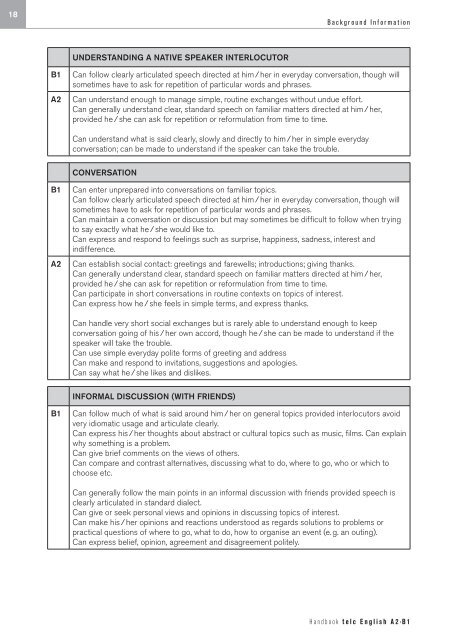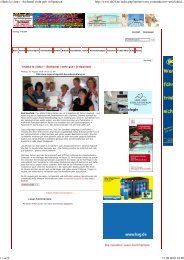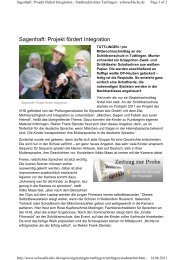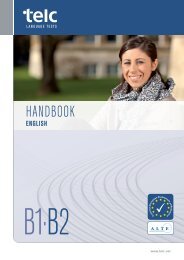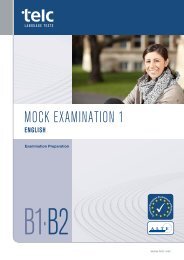Download Handbook (PDF, 4,3 MB) - telc GmbH
Download Handbook (PDF, 4,3 MB) - telc GmbH
Download Handbook (PDF, 4,3 MB) - telc GmbH
You also want an ePaper? Increase the reach of your titles
YUMPU automatically turns print PDFs into web optimized ePapers that Google loves.
18<br />
UNDERSTANDING A NATIVE SPEAKER INTERLoCUToR<br />
Background Information<br />
b1 Can follow clearly articulated speech directed at him / her in everyday conversation, though will<br />
sometimes have to ask for repetition of particular words and phrases.<br />
A2 Can understand enough to manage simple, routine exchanges without undue effort.<br />
Can generally understand clear, standard speech on familiar matters directed at him / her,<br />
provided he / she can ask for repetition or reformulation from time to time.<br />
Can understand what is said clearly, slowly and directly to him / her in simple everyday<br />
conversation; can be made to understand if the speaker can take the trouble.<br />
CoNVERSATIoN<br />
b1 Can enter unprepared into conversations on familiar topics.<br />
Can follow clearly articulated speech directed at him / her in everyday conversation, though will<br />
sometimes have to ask for repetition of particular words and phrases.<br />
Can maintain a conversation or discussion but may sometimes be difficult to follow when trying<br />
to say exactly what he / she would like to.<br />
Can express and respond to feelings such as surprise, happiness, sadness, interest and<br />
indifference.<br />
A2 Can establish social contact: greetings and farewells; introductions; giving thanks.<br />
Can generally understand clear, standard speech on familiar matters directed at him / her,<br />
provided he / she can ask for repetition or reformulation from time to time.<br />
Can participate in short conversations in routine contexts on topics of interest.<br />
Can express how he / she feels in simple terms, and express thanks.<br />
Can handle very short social exchanges but is rarely able to understand enough to keep<br />
conversation going of his / her own accord, though he / she can be made to understand if the<br />
speaker will take the trouble.<br />
Can use simple everyday polite forms of greeting and address<br />
Can make and respond to invitations, suggestions and apologies.<br />
Can say what he / she likes and dislikes.<br />
INFoRMAL DISCUSSIoN (WITH FRIENDS)<br />
b1 Can follow much of what is said around him / her on general topics provided interlocutors avoid<br />
very idiomatic usage and articulate clearly.<br />
Can express his / her thoughts about abstract or cultural topics such as music, films. Can explain<br />
why something is a problem.<br />
Can give brief comments on the views of others.<br />
Can compare and contrast alternatives, discussing what to do, where to go, who or which to<br />
choose etc.<br />
Can generally follow the main points in an informal discussion with friends provided speech is<br />
clearly articulated in standard dialect.<br />
Can give or seek personal views and opinions in discussing topics of interest.<br />
Can make his / her opinions and reactions understood as regards solutions to problems or<br />
practical questions of where to go, what to do, how to organise an event (e. g. an outing).<br />
Can express belief, opinion, agreement and disagreement politely.<br />
<strong>Handbook</strong> <strong>telc</strong> English A2·B1


